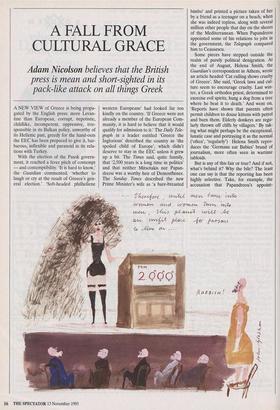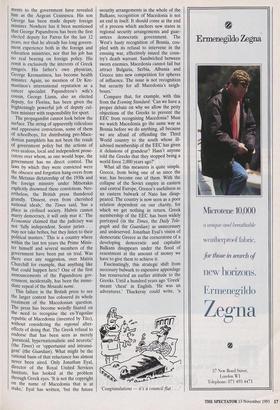A FALL FROM CULTURAL GRACE
Adam Nicolson believes that the British
press is mean and short-sighted in its pack-like attack on all things Greek
A NEW VIEW of Greece is being propa- gated by the English press: more Levan- tine than European, corrupt, nepotistic, childlike, incompetent, oppressive, irre- sponsible in its Balkan policy, unworthy of its Hellenic past, greedy for the hand-outs the EEC has been prepared to give it, bar- barous, inflexible and paranoid in its rela- tions with Turkey.
With the election of the Pasok govern- ment, it reached a fever pitch of contempt — and contemptibility. 'It is hard to know,' the Guardian commented, 'whether to laugh or cry at the result of Greece's gen- eral election.' Soft-headed philhellene western Europeans' had looked far too kindly on the country. 'If Greece were not already a member of the European Com- munity, it is hard to believe that it would qualify for admission to it.' The Daily Tele- graph in a leader entitled 'Greece the Inglorious' described the country as 'the spoiled child of Europe', which didn't deserve to stay in the EEC unless it grew up a bit. The Times said, quite funnily, that '2,500 years is a long time in politics' -and that neither Mitsotakis nor Papan- dreou was a worthy heir of Demosthenes. The Sunday Times described the new Prime Minister's wife as 'a bare-breasted bimbo' and printed a picture taken of her by a friend as a teenager on a beach, when she was indeed topless, along with several million other people that day on the shores of the Mediterranean. When Papandreou appointed some of his relations to jobs in the government, the Telegraph compared him to Ceausescu.
Some pieces have stepped outside the realm of purely political denigration. At the end of August, Helena Smith, the Guardian's correspondent in Athens, wrote an article headed 'Cat culling shows cruelty of Greece'. She said, 'Greek laws and cul- ture seem to encourage cruelty. Last win- ter, a Greek orthodox priest, determined to exorcise evil spirits, hung a dog from a tree where he beat it to death.' And went on, 'Reports have shown that parents often permit children to douse kittens with petrol and burn them. Elderly donkeys are regu- larly thrown off cliffs by villagers.' By tak- ing what might perhaps be the exceptional, lunatic case and portraying it as the normal (often', 'regularly') Helena Smith repro- duces the 'Germans eat Babies' brand of journalism, more often seen in wartime tabloids.
But is any of this fair or true? And if not, what's behind it? Why the bile? The least one can say is that the reporting has been highly selective. Take, for example, the accusation that Papandreou's appoint-
ments to the government have revealed him as the Aegean Ceausescu. His son George has been made deputy foreign minister. Nowhere has it been mentioned that George Papandreou has been the first elected deputy for Patras for the last 12 years, nor that he already has long govern- ment experience both in the foreign and education ministries, nor that his job has no real bearing on foreign policy. His remit is exclusively the interests of Greek emigres. His father's own physician, George Kremastinos, has become health minister. Again, no mention of Dr Kre- mastinos's international reputation as a cancer specialist. Papandreou's wife's cousin, George Lianis, also an elected deputy, for Florina, has been given the frighteningly powerful job of deputy cul- ture minister with responsibility for sport.
The propagandist cannot look below the surface. The string of apparently ridiculous and oppressive convictions, some of them of schoolboys, for distributing pro-Mace- donian pamphlets has not been the result of government policy but the actions of over-zealous, local and independent prose- cutors over whom, as one would hope, the government has no direct control. The laws by which they were convicted were the obscure and forgotten hang-overs from the Metaxas dictatorship of the 1930s and the foreign ministry under Mitsotakis explicitly disowned these convictions. Nev- ertheless, the British press thundered grandly. 'Dissent, even from cherished national ideals,' the Times said, 'has a place in civilised society. Hubris cannot marry democracy, it will only mar it.' The Economist claimed that the judiciary was not 'fully independent. Senior jurists . . . may not take bribes, but they listen to their Political masters.' This is a country where Within the last ten years the Prime Minis- ter himself and several members of the government have been put on trial. Was there ever any suggestion, over Matrix Churchill for example, that anything like that could happen here? One of the first announcements of the Papandreou gov- ernment, incidentally, has been the imme- diate repeal of the Metaxiki nomi.
This failure in the British press to see the larger context has coloured its whole treatment of the Macedonian question. The press has become weirdly fixated on the need to recognise the ex-Yugoslav republic of Macedonia (invented by Tito), Without considering the regional after- effects of doing that. The Greek refusal to endorse that has been seen as merely paranoid, hypernationalistic and neurotic' (the Times) or 'opportunist and intransi- gent' (the Guardian). What might be the rational basis of that reluctance has almost never been aired. Only Jonathan Eyal, director of the Royal United Services Institute, has looked at the problem through Greek eyes. 'It is not the copyright on the name of Macedonia that is at stake,' Eyal has written, 'but the future
security arrangements in the whole of the Balkans; recognition of Macedonia is not an end in itself. It should come at the end of a process which anchors new states in regional security arrangements and guar- antees democratic government. The West's hasty recognition of Bosnia, cou- pled with its refusal to intervene in the ensuing war, effectively issued the coun- try's death warrant. Sandwiched between sworn enemies, Macedonia cannot fail but attract Bulgaria, Serbia, Albania and Greece into new competition for spheres of influence. The issue is not recognition but security for all Macedonia's neigh- bours.'
Compare that, for example, with this from the Evening Standard: 'Can we have a proper debate on why we allow the petty objections of the Greeks to prevent the EEC from recognising Macedonia? Must we watch Macedonia go the same way as Bosnia before we do anything, all because we are afraid of offending the Third World country to the south whose ill- advised membership of the EEC has given it delusions of grandeur? Hasn't anyone told the Greeks that they stopped being a world force 2,000 years ago?' What all this measures is quite simple. Greece, from being one of us since the war, has become one of them. With the collapse of the Soviet empire in eastern and central Europe, Greece's usefulness as an eastern bulwark of Nato has disap- peared. The country is now seen as a poor relation dependent on our charity, for which we get nothing in return. Greek membership of the EEC has been widely portrayed (in the Times, the Daily Tele- graph and the Guardian) as unnecessary and undeserved. Jonathan Eyal's vision of democratic Greece as the cornerstone of a developing democratic and capitalist Balkans disappears under the flood of resentment at the amount of money we have to give them to achieve it.
Fascinatingly, this strategic shift from necessary bulwark to expensive appendage has resurrected an earlier attitude to the Greeks. Until a hundred years ago 'Greek' meant 'cheat' in English. 'He was an adventurer,' Thackeray could write, 'a 'Congratulations — its a council flat . . . pauper, a blackleg, a regular Greek.' This meaning of the word has a long history — a 16th-century dictionary describes a Greek simply as a 'twister'. In the light of the classical ideals, this corruption was even more reprehensible. The inhabitants of Greece, one 17th-century Englishman wrote, `once so glorious, and famous for their happy estate, are now through vice and ingratitude become the most deplored Spectacle'. They had suffered, as Sofka Zinovieff, the Cambridge anthropologist, has put it, 'a fall from cultural grace'. Modern Londoners, not Athenians, were the true descendants of the 5th-century heroes. This is the foundation of the British argument for keeping the Elgin Marbles: we are more appropriate heirs to the inheritance of classical Greece than the Greeks themselves. All the points made about the corrosive and polluting air of Athens which would eat away at the marble draw their real strength from a metaphor: it is not the air but modern Greek culture that is considered so cor- rupting.
The post-war vision of relatively power- ful and rich countries helping the less well endowed to better themselves, founded as It was on the need to contain communist expansion, has been replaced by something meaner and more short-sighted — a view of foreigners as dirty, grasping devils who will cheat you when they can.




























































 Previous page
Previous page